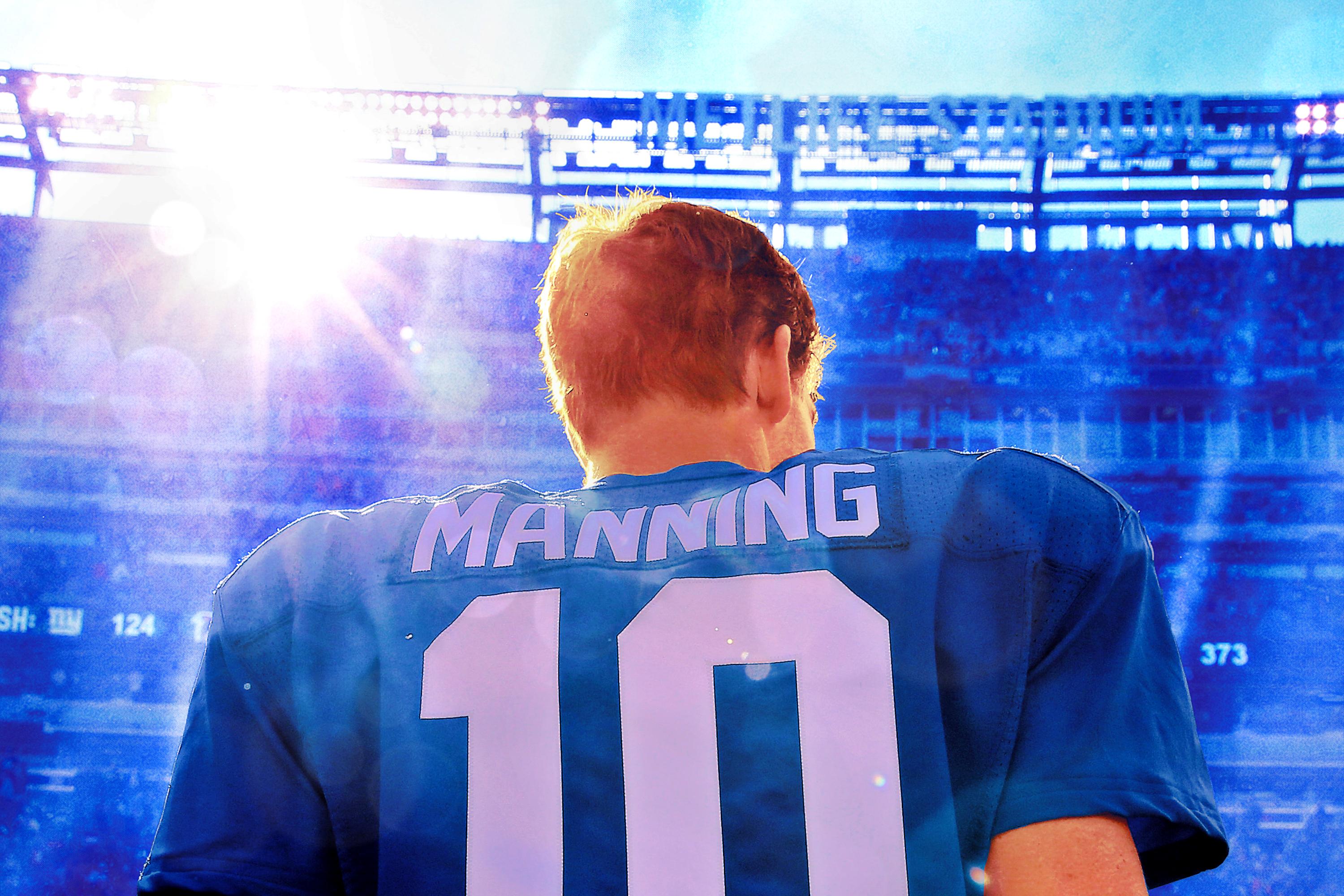
From February 2008 to November 2015, the Patriots won a game against every team in the NFL other than the New York Giants. About five years ago, a reporter asked Eli Manning about that.
“Caught ’em on the right nights, I guess,” Manning said. It’s the perfect summary for an imperfect career. Manning will announce his retirement on Friday, ending his 16-year career with the New York Giants and beginning a five-year debate about whether or not he belongs in the Pro Football Hall of Fame. Manning has been paid more by the NFL than any other player in the history of the game and is one of five players with multiple Super Bowl MVP trophies despite being mediocre for most of his 16 seasons. If comparison is the thief of joy, then it’s lucky Manning’s career is incomparable.
The New York Giants’ victory against the 18-0 Patriots in Super Bowl XLII was the biggest upset in pro football history in four decades. That win established the 2007 Giants as one of the most famous usurpers in the history of sports, but winning the Super Bowl rematch with the Patriots four years later distinguished them from every other historic underdog.
It’s rare that a massive upset gets a rematch at all. Buster Douglas never fought Mike Tyson again. University of Maryland, Baltimore County is probably not going to play UVA for a long time. And the upsets that do get rematches virtually never have the same results. Appalachian State’s football team lost its rematch with Michigan by 38 points. After Super Bowl III, the Jets lost their next four games against the Indianapolis Colts. After the Miracle on Ice, USA Hockey lost their next matchup with the USSR. But the Giants didn’t just defeat the greatest dynasty in American sports history at its apex: They did it twice. The history of pro football can’t be told without the Patriots, and the history of the Patriots can’t be told without Eli Manning.
Manning was not easy to root for at first. Most of the world became acquainted with him when the bratty princeling refused to play for the San Diego Chargers before the 2004 draft. Other players have made this kind of power move. Stanford quarterback John Elway said he’d play for the Yankees instead of the Colts when Baltimore drafted him in 1983. The difference was that Eli did not have another career to pursue—he just said he wasn’t going to play for the Chargers. So the Giants traded Philip Rivers and a future first-rounder for their franchise quarterback.
Manning’s regular-season career record sits at 117-117, which is perfectly Eli. He played 16 seasons, but the only significant passing category he ever led was interceptions. He made four Pro Bowls in 16 years, half the number of trademate Rivers and just one more than Cincinnati’s Andy Dalton. Perhaps more damning is that Manning played 236 regular-season games, but was named the NFC Offensive Player of the Week just four times, the same amount as Kirk Cousins. Even Kerry Collins, a quarterback whose name will make any Giants fan groan (I know because I am one), won NFC Offensive Player of the Week four times in five seasons with New York.
The truly underrated part of Manning’s career is his longevity. He never missed a game due to injury, and his 210 consecutive starts streak is the third longest for a quarterback in NFL history. His long, healthy stretch in the league has put him toward the top of most career passing leaderboards. Manning is seventh all time in passing yards and passing touchdowns, but those highs don’t reflect his week-to-week or year-to-year impact. Eli’s career yards per pass attempt rank is 87th all time, and his touchdowns per throw rank is 71st. He is the active leader in interceptions, and that isn’t due to his longevity. Manning’s career interception percentage is higher than Blake Bortles’s.
But nobody is arguing that Manning deserves to make the Hall of Fame because of his regular-season numbers. Debating Eli Manning’s regular-season numbers is like Jeff Bezos getting mad about how his face looks in his leaked dick pics. When it comes to Manning’s Hall of Fame candidacy, we are focusing on a small but crucial part of the picture.
The 18-0 Patriots opened as 14-point favorites in Super Bowl XLII, and a win would have secured their place as the greatest team in football history, and perhaps American sports too. But the Giants won 17-14, and Manning was named Most Valuable Player. (If the award could have gone to the Most Valuable Players, it would have gone to the Giants defensive line, which dominated the Patriots offensive line. New York sacked Tom Brady five times after he’d been sacked just 24 times in the other 18 games.) Manning’s best work came along with a lot of luck. His game-saving throw to David Tyree is the most iconic play in NFL history (apologies to “the catch”). But often forgotten is the play before, when Manning and Tyree miscommunicated on a route and Manning threw the ball directly to Patriots cornerback Asante Samuel, who dropped the pass.
In the end, Samuel didn’t catch his ball, and Tyree caught his. And four plays after the helmet catch, Manning threw the game-winning touchdown. This was Manning’s entire career in a nutshell—no, no, YES, YES!!!!!
“Manning, lobs it, Burress, alone, TOUCHDOWN NEW YORK!”
In the playoffs after the 2011 season, the Giants once again beat the Packers, defeating a 15-1 Green Bay team led by Aaron Rodgers, who had just finished perhaps the best season any quarterback has ever had. Rodgers is the Hail Mary GOAT, but in that game, Manning was the one who completed a Hail Mary.
The win sent the Giants to the NFC championship game, which was perhaps the luckiest game of Manning’s very lucky career. San Francisco punt returner Kyle Williams lost a fumble in the fourth quarter and another one in overtime to hand the Giants a 20-17 victory and Super Bowl berth. Facing the Patriots in the Super Bowl again was almost too good to be true, and the rematch was even weirder than the original. The first play of the game was a safety. Ahmad Bradshaw scored the winning touchdown by accident by landing on his butt while trying to stop at the 1-yard line after the Patriots defense let him score. But the gist was the same as Super Bowl XLII. Down against the Patriots with less than four minutes to go, Manning ripped what would have been the pass of anybody else’s life on a 38-yard rope down the sideline to receiver Mario Manningham. Considering the stakes, it’s about as close to a perfect pass as there’s been.
Manning once again won Super Bowl MVP. He is one of five players to win two or more Super Bowl MVPs, along with Tom Brady, Joe Montana, Terry Bradshaw, and Bart Starr. Manning had plenty of help and a lot of luck en route to his two rings, but what Super Bowl–winning quarterback hasn’t? Despite Manning’s flaws, he delivered when the team needed him most.
Manning is many contradictions wrapped into one: clumsy but clutch, coddled but confident, calm but chaotic. He won a slugfest with the greatest dynasty in American sports history at its apex twice. The rest of his career was fine. Sometimes it’s about the right nights.
An earlier version of this piece misstated the number of plays between the David Tyree “helmet catch” and the game-winning touchdown throw in Super Bowl XLII; it was four plays after the catch, not the very next play.

